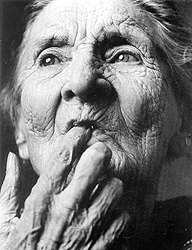

There have been and are many different theories explaining what exactly causes Alzheimer's disease. One past theory suggested that excessive amounts of aluminum in one's body resulted in a higher risk of Alzheimer's disease. Everyone has some aluminum in their bodies, which is nothing to worry about, as long as it doesn't reach dangerous levels. One way people attain these high levels of aluminum is through kidney dialysis, which involves aluminum. Some of the people who undergo kidney dialysis, or the mechanical cleansing of the fluids normally filtered by the kidneys, suffer from a form of dementia symptoms known as aluminum intoxication. A more modern theory for what causes Alzheimer's disease recognizes that it may be hereditary. Studies have been conducted in hopes of finding out if this is truly a cause, and it turns out that only ten percent of all Alzheimer's cases are inherited genetically. The rest are considered spontaneous.
The following symptoms range from mild to severe cases of Alzheimer's disease chronologically:
Increased forgetfulness that interferes with ability to hold a job or complete household tasks.
Forgets names for simple things like salt, pepper, bread or butter.
Has trouble recognixing what numbers mean.
Decreased judgement/reason.
Lost ability to recognize close friends/family.
Wanders, gets lost.
Insomnia.
Can't use/understand words.
Difficulty eating.
Inability to dress, bathe, and urinate independently.